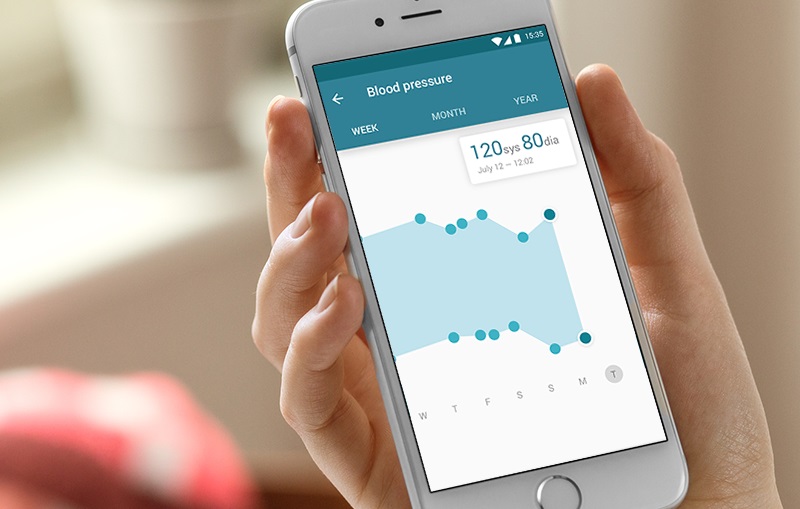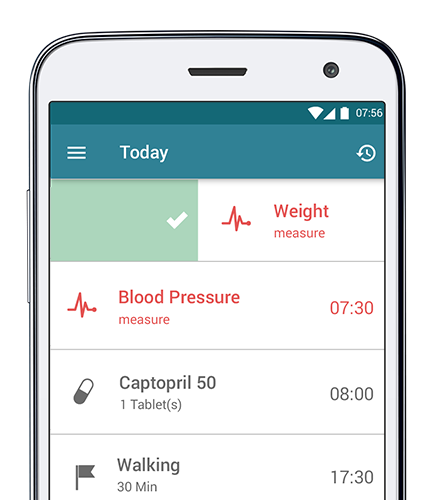Your Health and Hypertension: Monitor Symptoms and Track Everything You Need with a Medication Management App
Hypertension Is Known as the Silent Killer for a Reason. Make Sure You Manage Your Blood Pressure Effectively with a Smartphone App

Hypertension (commonly known as high blood pressure) is the most prevalent chronic condition in the world. Statistics indicate that it affects more than 1 in 4 adults in England and 1 in every 3 adults in the USA (about 75 million adults). For many people, hypertension feels more like an inconvenience than a major health condition. However, if left untreated, hypertension can lead to life-threatening complications such as stroke, kidney disease, or heart failure. One of the major challenges when it comes to treating hypertension is that patients often do not experience immediate results when taking their medication, meaning that they then stop or forget about their condition and treatment plan. Yet despite this setback, high blood pressure is usually easy to treat and manage and this is where tools, such as the smartphone app, MyTherapy, come in handy. MyTherapy functions as both a medication reminder and health journal. It ensures that you stick to your treatment plan, monitor your symptoms and progress, and take your medication responsibly. Furthermore, you can print the results from all data recorded in the app and share them with your doctor. This enables your doctor to gain insight into how you are progressing with treatment and make adjustments if needs be.
Treating and managing hypertension come in various forms. For example, regular exercise and a heart-healthy diet (avoiding too much salt, for example) can lower your blood pressure, so it is important that you try to eat healthy foods and get in a decent amount of exercise per week. Reducing your stress levels and making lifestyle changes, such as reducing alcohol intake and quitting smoking, can also help prevent or reduce high blood pressure. However, for the majority of patients living with hypertension, medication is usually required. The most common types of blood-pressure medications include: ACE inhibitors (e.g. Capoten, Zestril), angiotensin II receptor blockers (e.g. Atacand, Cozaar), and Beta blockers (e.g. Sectral, Tenormin).
MyTherapy is a multi-functional app that helps you keep track of your health by reminding you when to take your medication. With MyTherapy, you can easily record your symptoms and other important measurements (like your blood pressure readings and weight) and set daily diet and exercise goals. The app comes with a built-in medication database and uploading your medication is as easy as scanning the barcode on your medication package. You can set your alarms for various times as per prescribed instructions and use the alarm-reminder function to remind you of any upcoming medical appointments. As mentioned above, you can print out a health report based on your logged data and share this with your doctor. By sharing your blood pressure readings in this manner, your doctor can easily review your medication and treatment plan and, if necessary, make adjustments for the best possible results.
Aiming for 120/80
Blood pressure describes the force exerted by the blood against the walls of the blood vessels. It is determined by two numbers: the systolic and the diastolic pressure. The pressure depends on how hard the heart is working and the resistance to the flow of blood in the blood vessels. The systolic pressure is the higher number and refers to how much pressure is in the blood vessels when the heart beats. The diastolic pressure, which is the lower number, is the pressure in your blood vessels when the heart rests between beats. Both numbers are measured in millimeters of mercury (mmHg). The ideal blood pressure is considered to be between 90/60mmHg and 120/80mmHg. Medical guidelines define hypertension as a blood pressure that is above 130/80mmHg. Stage 1 hypertension ranges from 130-139/80-89mmHg and stage 2 hypertension is 140/90mHg or higher. If you are in between, then you are considered at risk of developing hypertension if you do not actively control it. High blood pressure is dangerous because it causes the heart to work harder, which can lead to atherosclerosis (the narrowing of blood vessels), stroke, kidney disease, or heart failure.
Hypertension rarely has any obvious symptoms and this is why it is known as the silent killer. The only way to diagnose it is to have your blood pressure checked regularly. High blood pressure can cause sweating, anxiety, sleeping problems, and blushing; but for the most part, there will be no symptoms at all. If blood pressure reaches a very dangerous level, called hypertensive crisis, then nose bleeds and headaches can occur.
Primary vs secondary hypertension
High blood pressure that is not caused by another disease or condition is referred to as primary (essential) hypertension. If it occurs due to the presence of another condition, then it is known as secondary hypertension.
There are several factors that increase the risk of developing hypertension. These include:
- Smoking
- Being overweight or obese
- Old age
- Lack of exercise
- Regularly drinking large amounts of alcohol
- A diet high in salt
- Long-term sleep deprivation
- Stress
The numerous conditions and medications that can cause secondary hypertension include:
- Kidney problems
- Diabetes
- Pregnancy
- Obstructive sleep apnea
- Tumors in the adrenal gland
- Hormone problems (underactive or overactive thyroid)
- Lupus
- Scleroderma
- Certain medications (e.g. some birth control pills, some over-the-counter cough and cold remedies, steroid medication)
Hypertension-Related Complications
Uncontrolled and untreated high blood pressure can lead to life-threatening complications, such as:
- Heart attack or stroke
- Aneurysm
- Heart failure
- Kidney problems
- Loss of vision due to thickened, narrowed, or torn blood vessels in the eyes
- Dementia
Reducing Blood Pressure with Medication and Lifestyle Changes
If you have been diagnosed with hypertension, then you may require medication to keep your blood pressure under control. There are different types of blood pressure medication and the medication that works best for you will depend on several factors such as your age, ethnicity, and the risk of other problems developing as a result of hypertension medication. Your doctor will discuss the various drugs with you and help you decide on the ones that will work most effectively. Common blood pressure medications include:
- Angiotensin-converting enzyme (ACE) inhibitors. These drugs block the formation of a chemical that narrows blood vessels. Taking ACE inhibitors will help relax your blood vessels. ACE inhibitors include lisinopril (Zestril), benazepril (Lotensin), captopril (Capoten).
- Angiotensin II receptor blockers (ARBs). These drugs work by blocking the action (not the formation) of the chemical that narrows the blood vessels. Therefore, they work similarly to ACE inhibitors and are recommended if ACE inhibitors cause problematic side effects. Common ARBs include candesartan (Atacand) and losartan (Cozaar).
- Calcium channel blockers. These work by relaxing the muscles of the blood vessels. Drinking grapefruit juice while taking calcium channel blockers can increase the risk of side effects. Calcium channel blockers include amlodipine (Norvasc) and diltiazem (Cardizem).
- Diuretics. These drugs act on the kidneys and help the body flush out excess sodium and water, thereby reducing the blood volume. Common diuretics include hydrochlorothiazide (Microzide) and chlorthalidone.
- Beta blockers. These drugs reduce blood pressure by making the heart beat slower and with less force. They are not as effective as the other medications and are therefore often prescribed together with other drugs. Common beta-blockers include acebutolol (Sectral) and atenolol (Tenormin).
Apart from medication, you will also be advised to make changes to your lifestyle to reduce your blood pressure. Effective lifestyle changes include:
- Reducing salt intake
- Eating a balanced diet (eating more fruits and vegetables and less fat)
- Increasing physical activity
- Reducing alcohol intake
- Losing weight
- Reducing caffeine intake
- Stopping smoking
- Getting at least six hours of sleep every night
Healthy Heart, Healthy Life with MyTherapy
Hypertension is usually asymptomatic, meaning that most patients do not really feel ill. For these patients, medication adherence can be a challenge because they simply do not feel sick and therefore either forget to take their medication or think that they no longer need it. However, if not treated properly, hypertension can develop into life-threatening health conditions. It is therefore imperative that you, the patient, do not stop taking your medication until advised by a healthcare professional. With the continuous development of smartphone apps, there are now great tools available that make medication adherence for hypertension patients much easier. MyTherapy is tailored to your individual needs and can help you reduce your blood pressure effectively and responsibly. Its medication reminders are reliable and the app’s built-in medication database is for any type of medication (not just for hypertension). Additionally, the health diary can be used to monitor your blood pressure, other health information, and lifestyle changes. The app makes it easier for your doctor to gain an overview of your condition and create a treatment plan that is best suited to your needs. These features make MyTherapy a supportive, practical tool that encourages you to manage your hypertension, whether you are experiencing symptoms or not. Start MyTherapy today and begin your new, heart-healthy lifestyle.


